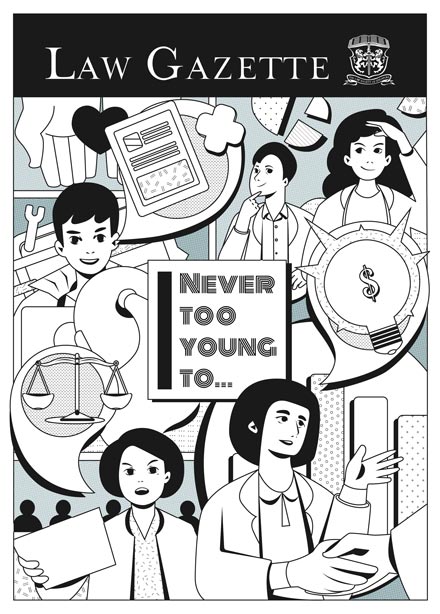
A New Trajectory for Legal Innovation
Firms in Singapore are Leading the Charge for Asia
Singapore has made great strides in establishing itself as a leading regional legal hub. The past few years alone have seen the launch of the Singapore International Commercial Court, the Singapore International Mediation Centre, as well as other developments in international legal services and dispute resolution. Aside from hard infrastructure, the government has also taken the initiative to put into place soft measures such as awarding licenses to foreign law firms to practise Singapore law and encouraging profit sharing agreements and formation of joint ventures between foreign and domestic firms.
There is no doubt that the liberalisation of the market has resulted in intensified (although healthy) competitive pressure within our still-conservative industry. Adding to this is a paradigm shift in the global legal industry in the form of new service delivery models and technology that had led to growing client demands for firms to be more efficient and transparent, which is fast rendering old ways of working obsolete.
“It is no exaggeration to say that as a profession, we lawyers are standing at a crossroads: and the better view is that instead of choosing to resist the tide and ignore the disruption and potential benefits of legal technology, we should do our best to ride its crest … [and] build the next paradigm for legal services.”
– Legal Technology Vision 2017, SAL
Defining Innovation
For a decade, “innovation” has been a buzzword in nearly every industry, and over the years has become increasingly associated with new technologies that change the way we live our lives and that render old technology obsolete. Fundamentally though, the scope of innovation is larger, and is best understood as the act of making changes in the established by introducing new and creative methods, ideas, or products.
In business, such a change should lead to a solution to a problem, be scalable, and add value for the business and the customer. Innovative ideas should lead to improved commercial outcomes, contributing to growing revenue and profit for the organisation. As a result, many organisations have started to put together think tanks to drive the creation of new ideas. That said, creative ideas don’t just come from people at the top or people with select training, and instead can come from anywhere within the organisation.
As such, employers should focus and invest in nurturing a culture of innovation within the organisation and provide an environment that supports innovation. At Thomson Reuters, for instance, employees are encouraged to form internal teams to develop new concepts and ideas, then present and defend them to the innovation investment committee. Successful ideas are then funded and implemented throughout the business.
Innovative ideas can also come from clients. Engaging with clients is the best way to know what challenges they face and what they need from you — valuable information which you can then use as a basis for a solution.
Moving the Needle
Firms like WongPartnership are leading the charge to answer the government’s call for innovation in Singapore. A major provider of regional and international legal services in the Asia Pacific region, the firm last year announced a partnership with a London-based company to deploy Luminance in support of its M&A practice, becoming the first major Singapore headquartered firm to harness artificial intelligence (AI). With the platform’s unique ability to automatically sort, cluster, and classify data so it can pinpoint even the subtlest difference between contracts, lawyers are able to conduct due diligence and other contract review processes more effectively and efficiently.
Barely a month later came a second announcement on a firm-wide adoption of Thomson Reuters’ Contract Express, an advanced document automation technology that offers an easily deployed, scalable, and intuitive solution for digital document drafting. The revolutionary technology allows lawyers to automate customised templates within the commonly used Microsoft Word with a simple mark-up function. Not only does Contract Express streamline and optimise the document creation process, users report reductions in delays, costs, and risks inherent with manual drafting. With automated contract drafting, lawyers who previously had to manually perform or supervise these tasks are now able to take on higher value, strategic work.
WongPartnership’s Managing Partner Ng Wai King attributes the legal technology adoption journey to the pressing need to stay agile in a constantly evolving business environment. He believes that technology is key to growth.
“Lawyers are not immune from digital disruption that affects our clients. Technology is changing the way law is practiced, and as such, technological innovation must be a cornerstone of our firm’s growth. Working with Thomson Reuters will drive greater productivity at the firm across a range of technology solutions in our bid to continue delivering high quality and innovative services to our clients.”
– Ng Wai King, Managing Partner, WongPartnership
Rise of the Machines
Although traditionally an industry that has been slow to embrace new ideas and new ways of working, increased competition and thinning margins have forced law firms to take a long hard look at their business practices and workflow.
For instance, international firms in Singapore have moved towards new remuneration systems. Some have taken up roles traditionally not performed by legal services providers. Yet others have set up alternative legal services hubs in lower cost centres to manage document-intensive work, complementing high-end advice the firm also offers in other international hubs around the region.
In terms of technological innovation, at the cutting edge end of the spectrum are exciting developments such as ROSS, the world’s first robotic attorney powered by IBM’s Watson artificial intelligence which some US law firms have already started using. Capable of understanding questions and providing analytical answers, ROSS is used mostly to perform legal research, helping to prepare cases, like legal assistants or paralegals would. Unlike legal assistants or paralegals, ROSS can review and analyse much more information in shorter timeframes.
While ROSS is far from being a substitute for lawyers, some online legal services platforms bypass lawyers completely. Amazon’s online resolution platform makes use of algorithms to settle claims and compensate consumers in case of a dispute, while chatbot DoNotPay helps US and UK residents to appeal against parking tickets, generating customised appeal letters that can be submitted to court, all without a need for a human lawyer helming the process.
The Case for Technology
Nascent technologies like AI are still very much in development and considered niche applications both within and outside the legal sector. However, on the other end of the technological advancement spectrum are those that help to eliminate the need for repetitive, labour-intensive work, and technology that can be easily integrated into your workflow process today.
Many of your day-to-day tasks can be completed quicker, better, and with fewer resources through the use of technology. Processes can be automated, records digitised, and the practice made much more systematic and transparent, allowing for greater efficiency and profitability. While technology isn’t about to replace every single lawyer anytime soon, it can certainly augment your legal practice, not just by boosting productivity levels but also by giving you greater visibility and insight into client relationships so you can spot untapped opportunities to nurture.
Get started on your legal technology journey today by looking into programs that can be rolled out within your firm, such as marketing and business development tools and document automation software. As with the implementation of any technology, be sure to contact a trustworthy vendor that can help in selecting the right ones to fit the needs of your firm and provide unwavering support throughout the process.
Thomson Reuters
+65 6870 3645
[email protected]

This article is part of the August 2018 Special Issue produced for the newly called lawyers of Mass Call 2018.






